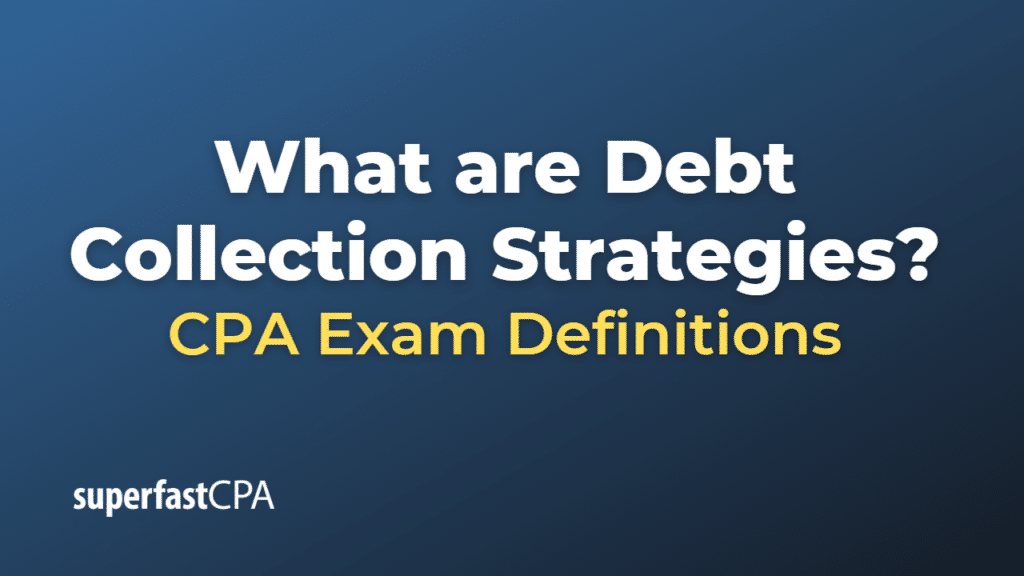Debt Collection Strategies
Debt collection strategies are the approaches and techniques used by businesses or debt collection agencies to recover money owed by individuals or businesses. The strategies can vary based on the nature of the debt, the debtor’s circumstances, and applicable laws and regulations.
Here are some common debt collection strategies:
- Reminder Calls and Letters: Often, the first step in debt collection is simply reminding the debtor about the outstanding debt. This can involve phone calls, letters, or emails, and can sometimes result in payment if the debtor simply forgot or overlooked the debt.
- Payment Plans: If a debtor is unable to pay the full amount at once, the creditor may agree to a payment plan. This allows the debtor to pay off the debt in smaller, more manageable amounts over time.
- Negotiation and Settlement: In some cases, the creditor may be willing to accept a lesser amount than what is owed to settle the debt. This can be beneficial for the creditor if they believe the debtor may not be able to pay the full amount.
- Legal Action: If other methods are unsuccessful, the creditor may choose to take legal action against the debtor. This could involve suing the debtor in court or seeking to garnish the debtor’s wages.
- Debt Selling: In some cases, a company might choose to sell the debt to a debt collection agency for a fraction of the amount owed. The collection agency then attempts to collect on the debt.
- Skip Tracing: If a debtor has moved and not left a forwarding address, debt collectors may use skip tracing to find the debtor. This involves gathering as much information as possible to track down a debtor who has ‘skipped’ out on their debt.
- Credit Reporting: Unpaid debts are often reported to credit bureaus, which can negatively affect the debtor’s credit score. This can be an incentive for the debtor to pay what they owe.
It’s important to note that debt collection is regulated in many jurisdictions to protect debtors from abusive or unfair practices. For example, in the United States, the Fair Debt Collection Practices Act (FDCPA) sets forth guidelines that debt collectors must follow when attempting to collect a debt.
Example of Debt Collection Strategies
Let’s consider a hypothetical example to illustrate how a company might use various debt collection strategies:
Scenario: XYZ Company has a customer, John, who has not paid his invoice of $5,000 for services provided, and it’s now 60 days overdue.
Strategy 1 – Reminder: Initially, XYZ Company sends a reminder email to John, noting the overdue invoice and asking for payment. They also follow up with a phone call to ensure John received the email and is aware of the outstanding balance.
Strategy 2 – Payment Plan: During the call, John indicates that he is experiencing some financial difficulties and can’t pay the full amount right now. XYZ Company suggests a payment plan, where John could pay off the debt in smaller monthly installments over the next six months.
Strategy 3 – Negotiation and Settlement: John still expresses concern about his ability to meet the suggested payment plan. XYZ Company, wanting to recover as much of the debt as possible and maintain a positive relationship with John, offers a settlement: John can pay $4,000 immediately to clear the entire debt.
Strategy 4 – Legal Action: If John still didn’t pay the debt, XYZ Company might consider taking legal action. They would likely consult with a lawyer or a debt collection agency to understand their options and the potential costs of this approach.
Strategy 5 – Debt Selling: If legal action is deemed too costly or time-consuming, XYZ Company might choose to sell John’s debt to a debt collection agency. This allows them to recover a portion of the debt immediately, while the collection agency takes over efforts to collect the full amount.
Strategy 6 – Credit Reporting: Throughout this process, XYZ Company might also report the unpaid debt to credit bureaus, which could negatively affect John’s credit score. This is often done in the hopes that it will encourage the debtor to pay.
In each step of this process, XYZ Company would need to ensure they are complying with applicable laws and regulations. For example, if this scenario took place in the United States, XYZ Company would need to comply with the Fair Debt Collection Practices Act (FDCPA), which sets rules for how debtors can be contacted, what can be said, and when calls can be made, among other things.













